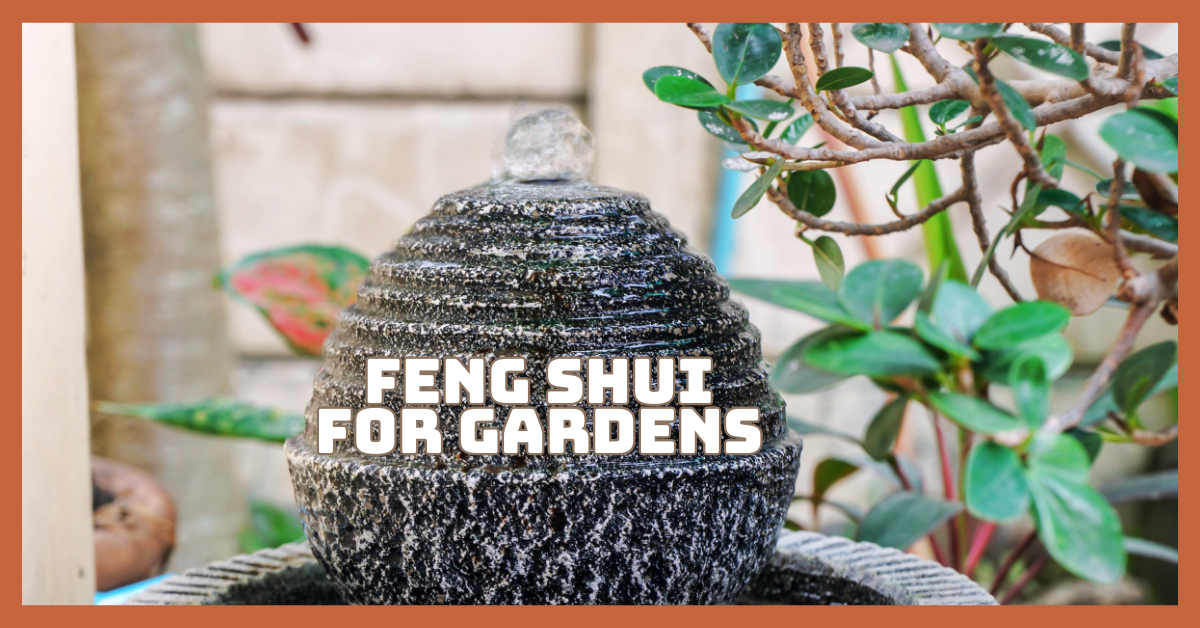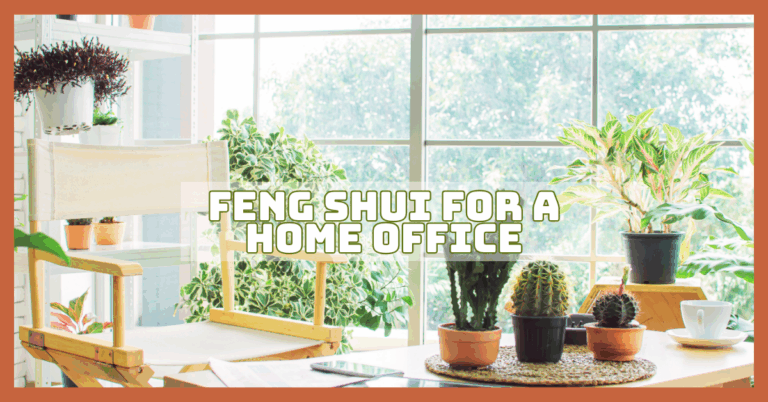Feng Shui For Gardens To Cultivate Peace And Good Fortune
Feng Shui for gardens is about creating harmony between nature and your living space. This ancient Chinese practice helps you design outdoor areas that attract positive energy, support well-being, and promote tranquillity.
By thoughtfully placing plants, water features, and pathways, you can transform any garden—big or small—into a peaceful retreat that nurtures the body, mind, and spirit.
Whether planting flowers or shaping a landscape, Feng Shui offers timeless wisdom for a balanced and beautiful garden.
Importance Of Feng Shui For Gardens
A garden is more than just a beautiful outdoor space—it’s an energetic extension of your home. Feng Shui, the ancient Chinese discipline of harmonizing environments, states that a well-designed garden can mirror the balance of nature, attract good energy (Chi), and enhance well-being.
Below are key reasons why Feng Shui is important for gardens:
1. Enhances Energy Flow (Chi)
Feng Shui emphasizes the smooth, uninterrupted movement of Chi, or energy. In gardens, cluttered pathways, dying plants, or blocked corners trap energy and create stagnation.
Designing with precise flow, like winding paths and a healthy, vibrant plan, allows positive energy to circulate freely, bringing vitality and balance to the space.
2. Strengthens Connection To Nature
Feng Shui encourages us to embrace natural elements as part of daily life. A garden with flowing shapes, native plants, and organic materials strengthens your connection to the earth.
This relationship helps ground your emotions, improve well-being, and bring the outdoors in, enhancing your inner peace and awareness.
3. Attracts Prosperity And Luck
In Feng Shui, certain plants and features symbolize abundance and luck. For instance, placing a small water fountain in the southeast area of your garden may enhance wealth energy.
Healthy greenery, colourful flowers, and lucky symbols like coins or wind chimes can amplify prosperity and positive energy in your life.
4. Reduces Stress And Anxiety
Calm, peaceful environments help reduce mental tension, and Feng Shui gardens are designed to do just that. With soft lighting, gentle curves, tranquil seating, and calming water sounds, your garden becomes a sanctuary where stress melts, and you can recharge emotionally and mentally in nature’s presence.
5. Supports Emotional Healing
Nature nurtures the soul, and Feng Shui gardens take this further by using gentle, healing elements. Fragrant flowers, balanced colours, and peaceful nooks create a comforting space. Spending time in this garden can help process emotions, promote self-care, and restore clarity.
6. Boosts Health And Vitality
Thriving plants, clean air, and well-placed garden features support your physical well-being. Feng Shui suggests growing herbs, fruits, and oxygen-rich plants to energize your body and promote wellness. A healthy garden beautifies your surroundings and fills your life with rejuvenating energy and natural vitality.
7. Balances Yin And Yang Energies
Feng Shui seeks to balance yin (soft, quiet) and yang (active, bold) forces. This means blending light and shadow, soft plants and hard stones, quiet spots and lively garden features.
The result is a stimulating and restful space, supported by dynamic energy and peaceful reflection.
8. Provides Protection And Boundaries
Clear boundaries in a garden create a sense of protection and order. Feng Shui often uses plants like bamboo or hedges to create natural screens that shield from harsh winds or noisy roads.
These boundaries help maintain a tranquil atmosphere, keep unwanted energy out, and define sacred, personal space.
9. Encourages Mindfulness And Connection
A Feng Shui garden is more than a visual delight—a place to slow down and reconnect. Thoughtful features like curved paths, meditation spots, and soft water sounds guide your senses inward.
This design encourages mindfulness, presence, and a more profound connection with nature, promoting peace and spiritual growth.
10. Invites Helpful Relationships
When your garden feels open, welcoming, and balanced, it attracts people and positive interactions. Feng Shui encourages cozy seating areas, harmonious layouts, and elements promoting conversation.
These touches make your garden a place where relationships can blossom, enriching your social life with support, joy, and mutual respect.
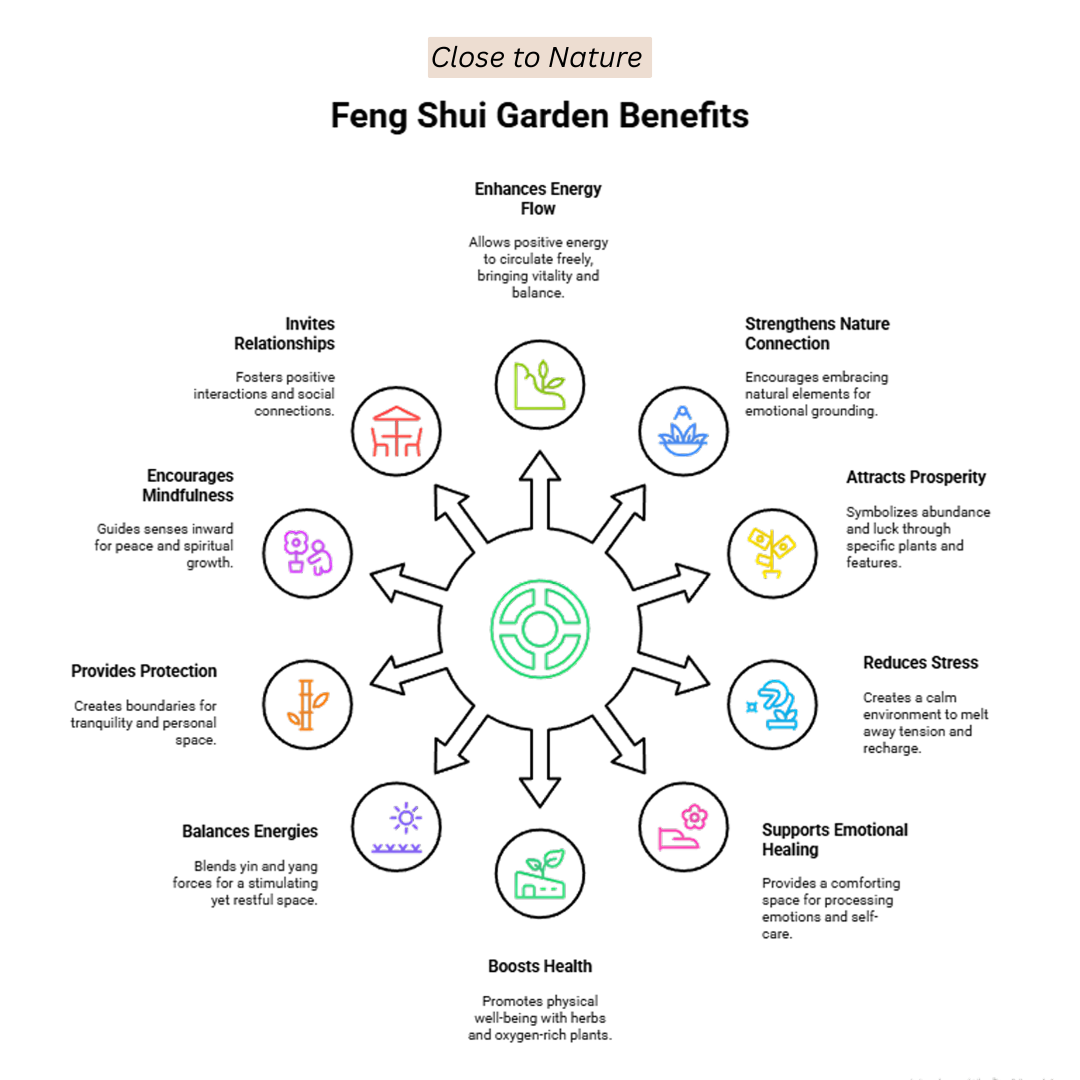
Feng Shui Tips For Gardens
Incorporating feng shui for gardens can transform your outdoor space into a harmonious sanctuary that fosters positive energy, promoting physical and emotional well-being.
Designing a garden that encourages balance and harmony invites positive energy (Chi) into your life, improving your physical and emotional health. Here are some essential Feng Shui tips to create a peaceful, vibrant garden:
1. Balance Yin And Yang
Incorporating both yin and yang elements in your garden creates a dynamic balance. Yin represents the softer, more nurturing aspects, such as shaded areas, water features, and gentle plants, while yang brings vibrancy through bright flowers, open sunlit spaces, and bold structures.
By blending these opposing forces, your garden becomes a harmonious space that fosters relaxation and activity. This balance nurtures emotional well-being, ensuring your garden feels calming without being too passive or overly stimulating.
Yin and yang balance encourage healthy, flowing energy and promote peace while inviting lively energy for rejuvenation.
2. Use Curved Pathways
Straight paths may seem logical, but they can disrupt the energy flow in your garden, creating a harsh, unbalanced environment.
Feng Shui encourages curved pathways, which guide the flow of Chi (energy) more naturally. Gentle, winding paths create a sense of calm and serenity, allowing you to experience the garden as a continuous, evolving space.
These curves help balance the energy by moving it smoothly throughout the garden, preventing stagnation. They also invite curiosity and exploration, enhancing the experience of connection with nature.
A curved path ensures that the energy flows freely, enriching the garden’s atmosphere.
3. Add Water Features
Adding water features is a vital element of feng shui for gardens, as it enhances abundance, prosperity, and emotional well-being, creating a serene and balanced environment in your outdoor space.
Incorporating a water feature, such as a small fountain or pond, activates positive energy and promotes a peaceful, nurturing environment.
The gentle sound of flowing water soothes the mind, creating a serene atmosphere while symbolizing the continuous flow of wealth and opportunity.
To ensure that the water remains a source of positive energy, it is essential to keep it clean and flowing. The garden may experience bad energy due to stagnant or unclean water.
Create a Profitable Holistic Business That Transforms Lives
🌿 Discover inspiring holistic business ideas that blend nature, wellness, and purpose.
Learn how passionate nature lovers are building income streams while helping others live more balanced, mindful lives.
Read Profitable Holistic Business Ideas That Transform Lives
4. Position Plants For Growth
Placing thriving plants in your garden encourages vitality and growth in your outdoor space and life. Healthy, blooming plants represent life’s potential and symbolize progress and new beginnings.
Avoid placing dead or wilted plants, as they are a sign of stagnation and can block the flow of positive energy (Chi). You may foster physical and mental well-being by concentrating on colourful, blooming plants.
Fresh flowers, lush greenery, and thriving herbs energize the space, inviting new opportunities, abundance, and growth into your life. Healthy plants elevate the energy of your entire garden.
5. Mindful Placement Of Statues Or Ornaments
Mindful placement of statues or ornaments is a key aspect of feng shui for gardens, as these elements help to influence the flow of energy, bringing peace, tranquillity, and harmony to your outdoor space.
For example, placing a Buddha or other calming figure can evoke tranquillity, promoting peace and relaxation. Statues of animals, such as a pair of birds, represent harmony and can encourage balanced relationships.
When positioning these items, be mindful of their placement to ensure they don’t disrupt the energy flow. Each ornament should be placed with intention, contributing to the overall harmony and purpose of the space.
Proper placement enhances the specific energy you wish to invite into the garden.
6. Add Natural Materials
Wood, stone, and clay are natural materials that help ground and stabilize energy by connecting your garden to the earth.
These elements bring a sense of authenticity, beauty, and balance. Steer clear of overusing synthetic materials like plastic, since they may disrupt the natural flow of Chi and create a sensation of alienation from the surroundings.
Wood, stone, and clay are timeless and bring a sense of permanence and strength to the garden, grounding you in the present moment.
The natural textures and colours enhance the garden's energy, fostering peace and a harmonious connection with nature.
7. Encourage Outdoor Living Spaces
Creating an outdoor living area, such as a seating nook or lounge, promotes relaxation and socialization.
These spaces are essential for connecting with nature and others, fostering positive relationships and emotional well-being. A comfortable area for rest allows you to unwind, recharge, and enjoy peaceful moments in nature.
These spaces can be designed with Feng Shui principles, incorporating harmonious elements such as balanced seating, natural materials, and soothing colours.
By encouraging outdoor living, you provide a retreat where the energy flows freely, promoting relaxation and reducing stress in your daily life.
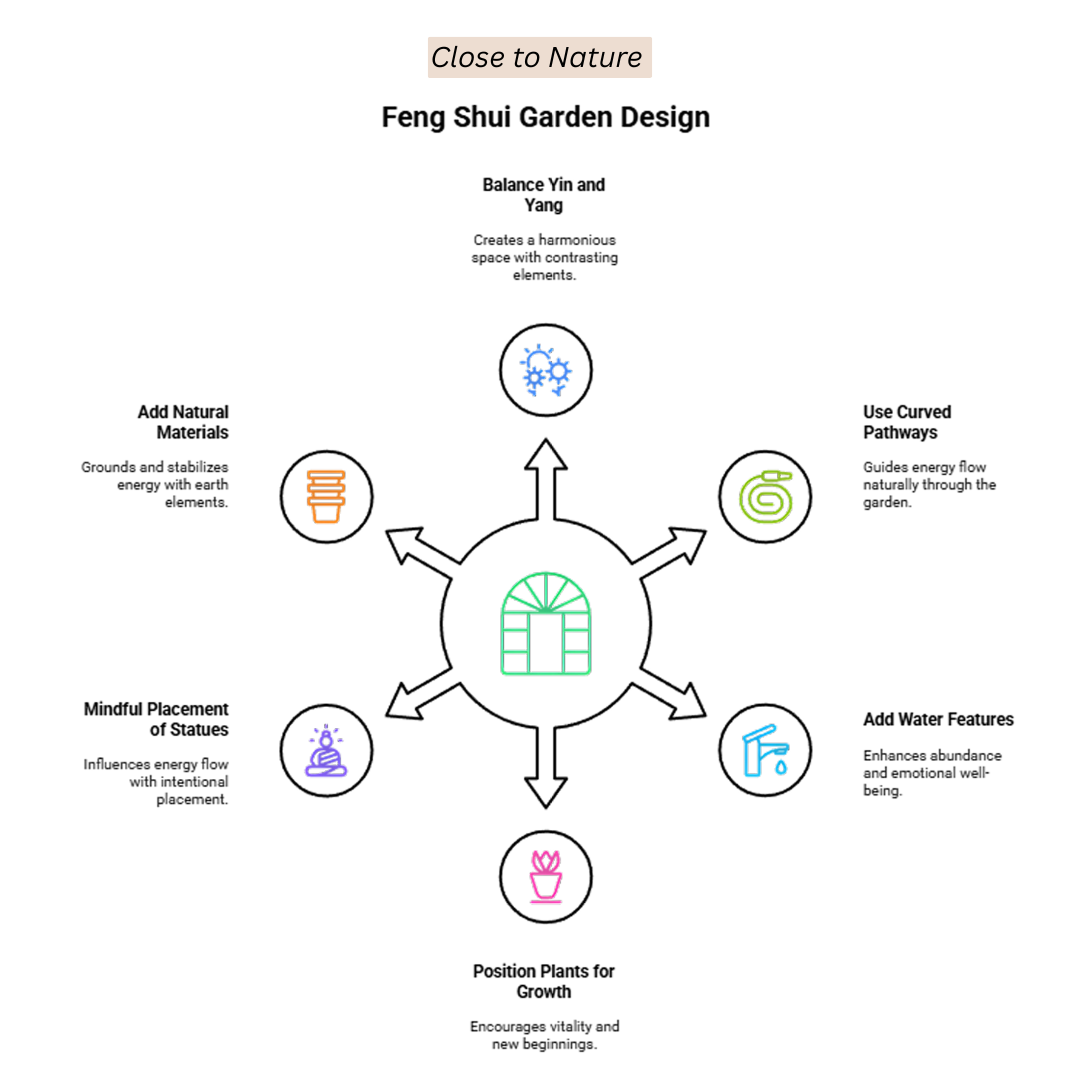
8. Create Boundaries With Plants Or Fencing
Boundaries in a garden help define the space and create a sense of protection, essential in Feng Shui. Use plants like bamboo, trim hedges, or climbing vines to create natural fences around your garden.
These boundaries provide a physical sense of enclosure and shield your space from negative influences like noise, traffic, or harsh winds.
Your outdoor area will continue to be a haven for rest and renewal if you follow the Feng Shui principle of boundaries, which also applies to emotional safety.
By carefully planning your garden's borders, you provide a peaceful and harmonious atmosphere within your space.
9. Encourage Flow With Symmetry
Encouraging flow with symmetry is a fundamental aspect of feng shui for gardens, as it creates balance and harmony, promoting the smooth circulation of positive energy throughout your outdoor space.
When plants, statues, or furniture are placed in pairs, it symbolizes equilibrium and promotes positive Chi. For instance, two matching planters flanking a door or a pathway create visual balance, enhancing energy flow through the space.
Symmetry can also enhance relationships and bring a sense of unity between people and elements of nature. By carefully arranging symmetrical elements, your garden will invite a peaceful, harmonious atmosphere, fostering positive energy and well-being.
10. Position Plants According To The Bagua Map
The nine regions that comprise the Bagua map are each connected to many facets of life, including relationships, health, and money.
In Feng Shui, positioning plants in specific areas of your garden, according to the Bagua, can enhance these aspects of life.
For example, plants in the wealth area (the southeast corner) can attract prosperity, while those in the relationship area (the southwest) foster harmony in your relationships.
By aligning plants with the Bagua map, you align your garden's energy to support personal growth, success, and balance. This intentional placement amplifies the garden’s potential to bring positive results.
11. Use Bright, Energizing Colours
Colours are significant in Feng Shui, as they are associated with different energies and emotions. Vibrant, bright colours like orange, purple, and red may give your landscape life and vibrancy.
These colours are particularly effective in areas of your garden that correspond to prosperity or new beginnings, like the entryway or wealth area (according to the Bagua).
However, it’s essential to use these colours thoughtfully—while they can energize, too much brightness can overwhelm the senses. Balance is key; vibrant colours should invigorate specific spaces without disrupting your garden's calm and harmony.
12. Regular Garden Maintenance
Regular maintenance is crucial for maintaining positive Chi in your garden. A cluttered, overgrown garden can trap stagnant energy and disrupt the flow of vitality.
Ensure your garden is regularly pruned, dead leaves are removed, and clutter is cleared. A tidy, well-maintained garden reflects clarity and balance, fostering a serene, inviting environment.
Keeping plants healthy and vibrant is essential for maintaining the garden’s energy, as dying or decaying plants can symbolize stagnation.
By maintaining your garden, you encourage the continuous flow of Chi, enhancing its healing and restorative effects, and creating a sanctuary of peace and vitality.
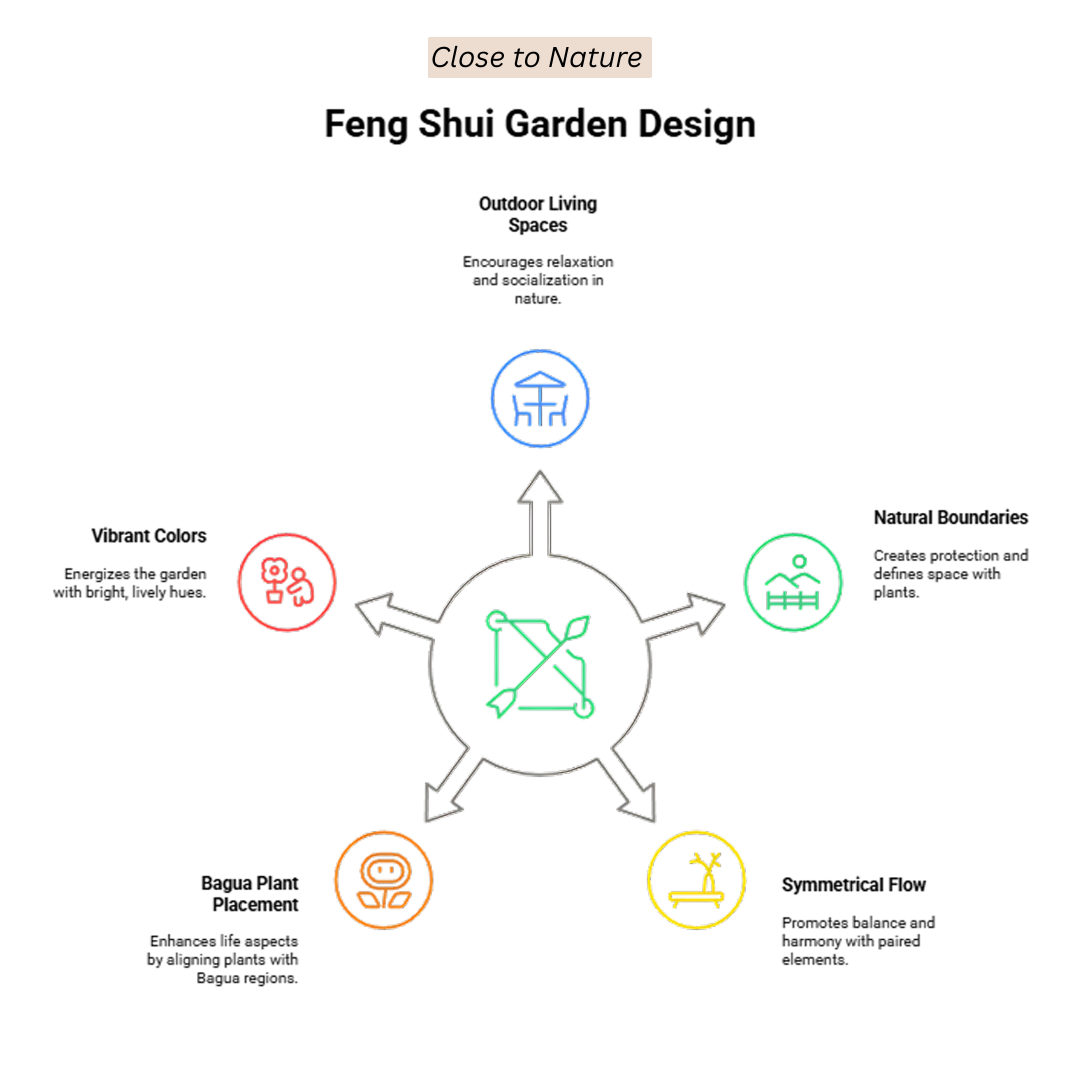
Common Feng Shui Mistakes To Avoid In Gardens
Creating a harmonious garden through Feng Shui involves more than aesthetics—it’s about aligning nature’s energy with your life. However, many people unintentionally make mistakes that disrupt this flow.
By following Feng Shui for gardens, you can avoid common mistakes that hinder energy flow, ensuring your outdoor space becomes a sanctuary of peace, health, and abundance.
Below are some frequent errors and why they can affect your garden's energy.
1. Ignoring Garden Maintenance
Mistake
Allowing your garden to become messy, with overgrown plants and clutter, signals neglect. In Feng Shui, such untidiness interrupts energy flow and weakens the garden's ability to nourish your space with vibrant, life-affirming Chi.
Why It’s A Problem
A poorly maintained garden invites stagnant energy, which can impact your mood, reduce motivation, and even affect your home’s overall harmony.
This imbalance may subtly influence stress levels, create emotional heaviness, and diminish the restorative power of your outdoor space. Regular upkeep is essential for sustaining a positive, supportive environment.
2. Using Harsh, Artificial Lighting
Mistake
Installing overly bright or stark lighting disrupts the garden’s natural ambiance. Instead of inviting calm, it overwhelms the senses and clashes with the soothing energy a garden should foster, especially during the evening.
Why It’s A Problem
Harsh lighting interferes with the garden’s ability to support relaxation and balance. It can agitate rather than calm, disrupting the yin energy needed at night.
This imbalance affects emotional well-being and prevents the garden from being a peaceful retreat that nurtures rest and harmony.
3. Placing Sharp Or Spiky Plants Near Entrances
Mistake
Using spiky plants like cacti near your garden entrance introduces aggressive energy. These sharp forms disrupt the natural flow and create tension, clashing with the welcoming atmosphere a garden entrance should convey.
Why It’s A Problem
Spiky plants generate “sha chi,” or attacking energy, which can push away positive influences. Instead of inviting peace and good fortune, this arrangement fosters discomfort and unease.
In Feng Shui, entry points should attract harmonious Chi, and harsh plants can block that beneficial flow.
4. Blocking Natural Pathways With Obstacles
Mistake
In Feng Shui for gardens, clear and unobstructed pathways are essential to maintain smooth energy flow and ensure the space feels harmonious and balanced.
This causes discomfort and breaks the visual and energetic harmony necessary for a peaceful, balanced garden space.
Why It’s A Problem
Obstructed paths lead to stagnant Chi and a sense of confinement, reducing the garden’s calming effect. Instead of flowing freely, energy becomes trapped or scattered, creating unease. Clear pathways are vital in Feng Shui to invite vitality, clarity, and effortless movement throughout the space.
5. Using Too Many Hard Materials
Mistake
Relying heavily on stone, metal, or concrete in garden design overwhelms the space with rigid, yang energy. This lack of softness disrupts harmony, reducing comfort and making the garden feel more like a structure than a sanctuary.
Why It’s A Problem
Too much yang energy from hard materials creates a harsh and emotionally distant environment. The space can't soothe or rejuvenate without enough yin elements—like plants, water, or wood. Balanced energy is key in Feng Shui, and this imbalance disrupts the garden’s ability to support well-being.
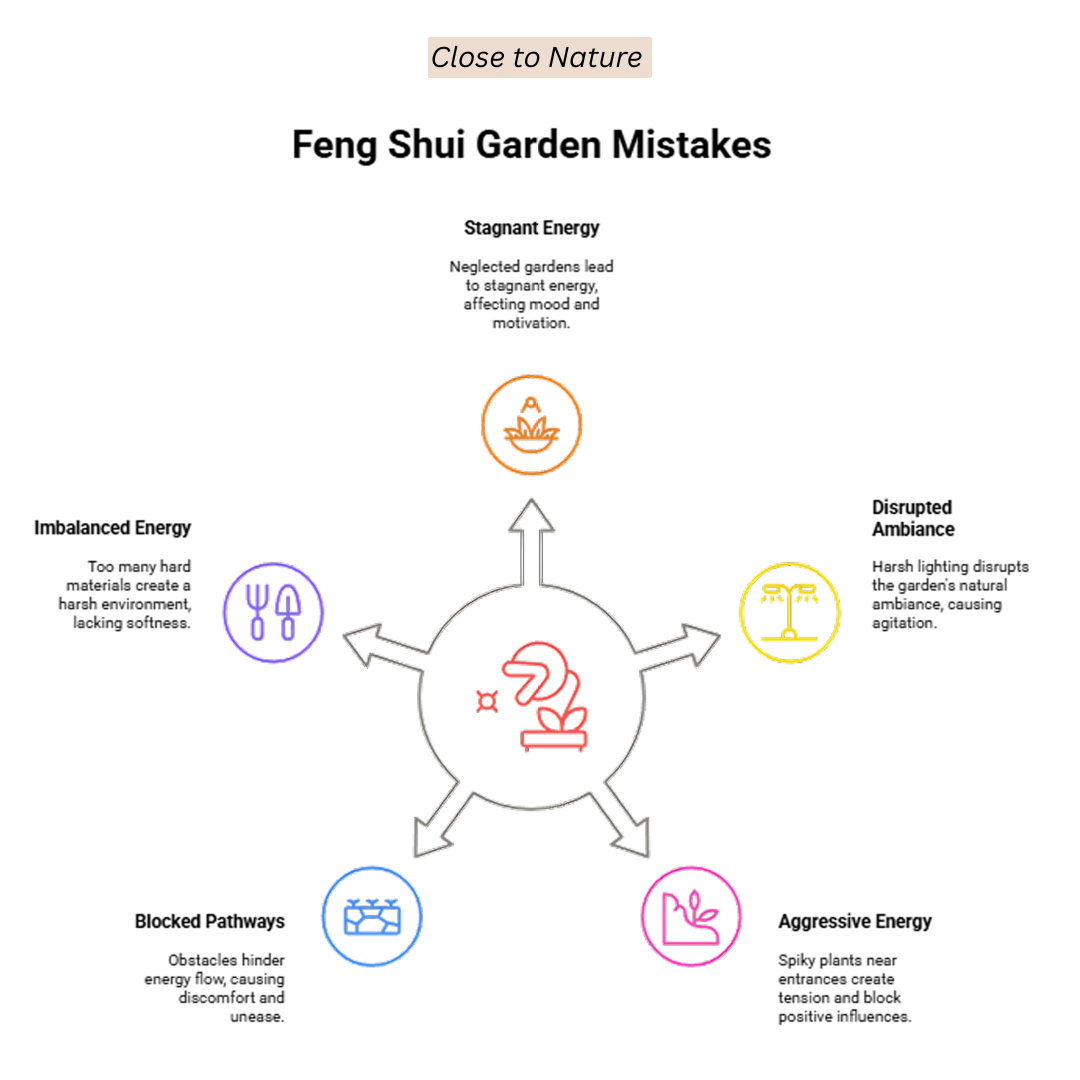
Conclusion
Feng Shui for gardens transforms outdoor spaces into areas of balance, peace, and positive energy. By harmonizing natural elements, maintaining clear paths, and nurturing plant life, you invite well-being, prosperity, and emotional healing into your life.
A well-designed Feng Shui garden isn’t just beautiful—it supports your physical, mental, and spiritual health. With thoughtful choices and mindful placement, your garden can become a powerful source of renewal, offering calm and connection every time you step outside.
I trust you enjoyed this article on the [Blog Topic]. Please stay tuned for more inspiring guides, helpful tips, and ideas to help you live closer to nature every day.
Take care!
— JeannetteZ🌿
💬 Your Opinion Is Important To Me
Do you have thoughts, ideas, or questions? I’d love to hear from you. Please leave your comments below or email me directly at Jeannette@Close-To-Nature.org.
📚 More Nature-Inspired Reads
Explore more ways to connect with nature, nurture your pets, and live in harmony with the world around you 🌿

